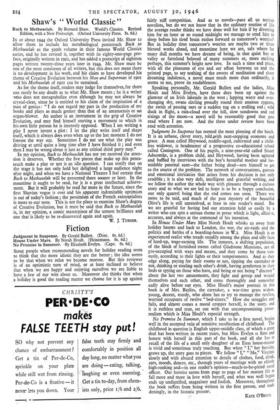Fiction
SOME people when recommending novels for holiday reading seem to think that the more idiotic they are the better ; the idea seems to be that when we relax we become morose. But this reviewer is of an optimistic turn of mind, or at least inclined to believe that when we are happy and enjoying ourselves we are liable to have a few of our wits about us. - Moreover she thinks that when a holiday is good the reading matter we choose for it is up against fairly stiff competition. And as to novels—pace all us serious novelists, but do we not know that in the otslinary routine of life the average reader thinks we have done well for him if by diverting him for an hour or so round midnight we manage to send him to sleep -before his tired brain rushes forward to tomorrow's worries? But in holiday time tomorrow's worries are maybe two or three blessed weeks ahead, and meantime here we are safe where for many dull months we have dreamt of being, in that quiet bay or valley or farmland beloved of many summers or, more exciting perhaps this summer's bright new love. In such a time and place, with all the pleasures of eye and ear afloat between us and the printed page to say nothing of the sweets of meditation and sheer dreaming indolence, a novel must much more than ordinarily, it seems to me, prove its readableness. - Speaking personally, Mr. Gerald Sullen and the ladies, Miss Hoult and Miss Evelyn, have these days been up against the glamour of an Irish lakeside in the west ; lapping water and ever- changing sky, swans circling proudly round their anxious cygnets, the swish of passing oars or a sudden tug on a trolling rod • wild duck in Bight, a rain-cloud over the hill, slow sundowns an red risings of the moon—a novel will be reasonably good that gets read where I am now. And the three under review have been read with attention.
Iudgment In Suspense has seemed the most pleasing of the batch. It is an urbane, clever story, told „with neat-stepping economy and grace. A man called Heywood, middle-aged, cultivated and a child- less widower, is headmaster of a progressive co-educational school called Conington. One of his pupils a nine-year-old called Stuart Adscombe, is a problem child, and Heywood, having been agitated and baffled by interviews with the boy's beautiful mother and for- midable paternal aunt—the father being dead—sets himself to get , to the source of the problem. The network of conversations, guesses and emotional intricacies that arises from his decision• is not only credible ; it is also very deft, intelligent and graceful writing, and we follow the author the whole way with pleasure through a curious story and to what we are led to hope is to be a happy conclusion, our only quarrel being that the end comes too soon. There was more to be said, and much of the past mystery of the beautiful Olive's life is still unresolved, at least in one reader's mind. But we are grateful for having had our attention held so easily by a writer who can spin a serious theme in prose which is light, allusi accurate, and always at the command of his intention.
In House Under Mars Miss Norah Hoult whisks us away from holiday haunts and back to London, the war, the air-raids and the politics and battles of a boarding-house in Vi.2. Miss Hoult is an experienced realist who treads steadily among the plain and silly facts of hard-up, wage-earning life. The inmates, a shifting population, of the block of furnished rooms called Gladstone Mansions, are all pre-occupied with ways and means, and they come by these vari- ously, according to their lights or their temperaments. And as they edge along, paying for their rooms or not, tipping the caretaker or not, duinking or stealing each other's drink, having gentlemen in their beds or spying on those who have, and being or not being f` discreet" about the last two amusements, they fight and gossip and wound themselves and each other, and come thoroughly and somewhat sadly alive before our eyes. Miss Hoult's major portrait in this book is of Mrs. Bayliss, the caretaker, a war-time grass widow, young, decent, sturdy, who alone has to try to manage the restless, worried occupants of twelve "bed-sitters." How she struggles and fails, and almost comes a moral cropper herself, is the story, and it is ruthless and true, set out with that uncompromising prose- realism which is Miss Houles especial strength.
No Promise In Summer, which I take to be a first novel, begins well in the accepted vein of sensitive recollection of childhood. The childhood in question is English upper-middle class, of which a great deal has been written in recent years, but Miss Evelyn is firm and honest with herself in this part of the book, and all she has to recall of the life of a small only daughter of an Eton house-master is vivid and sometimes truly touching. But when "I," her heroine, grows up, the story goes to pieces. We follow "I," "Me," Virginia slowly and with absurd attention to details of clothes, food, drink, cars, moods, dances, etc., through years of marriage with an elderly high-ranking and—in one reader's opinion—much-to-be-pitied naval officer. Our heroine seems from page to page of her mature life to fall more and more in love with herself, and what was well begun ends up undignified, magaziney and foolish. Moreover, throughout the book suffers from being written in the first person, and mad- deningly, in the historic presew.
KATE O'BRIEN.


























 Previous page
Previous page